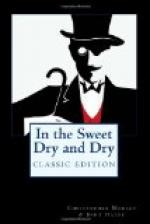At this moment they were held up by an armed guard of chuffs, stationed at the city limits. These saluted respectfully on seeing the Bishop’s daughter, but examined Bleak’s passport with care. Then the car passed on into the suburbs.
As they neared the fields of actual battle, Bleak was able to see something of the embittered nature of the conflict. In the hot white sunlight of the summer morning platoons of Pan-Antis could be seen marching across the fields, going up from the rest centers to the firing line. In one place a shallow trench had been dug, from which the chuffs were firing upon a blackberry hedge at long range. One by one the unprincipled berries were being picked off by expert marksmen. The dusty highway was stained with ghastly rivulets and dribbles of scarlet juices. At a crossroads they came upon a group of chuffs who had shown themselves to be conscientious objectors: these were being escorted to an internment camp where they would be horribly punished by confinement to lecture rooms with Chautauqua lecturers. War is always cruel, and even non-combatants did not escape. In the heat of combat, the neutrality of an orchard of plum trees had been violated, and wagonloads of the innocent fruit were being carried away into slavery and worse than death. A young apple tree was standing in front of a firing squad, and Bleak closed his eyes rather than watch the tragic spectacle. The apples were all green, and too young to ferment, but the chuffs were ruthless once their passions were roused.
They passed through the battle zone, and into a strip of country where pine woods flourished on a sandy soil. The fragrant breath of sun-warmed balsam came down about them, and Miss Chuff let out the motor as though to escape from the scene of carnage they had just witnessed.
“Whither are we bound?” asked the editor, with pardonable curiosity, as their tires hummed over a smooth road.
“Cana, New Jersey,” said Miss Chuff, “where poor Quimbleton is in hiding. He is in very sore straits. He narrowly escaped capture after the parade the other day. I managed to get him smuggled out of the city in the same ambulance that carried Father’s horse. The horse was drunk and Quim was sober. Wasn’t that an irony of fate? But I promised to tell you how I became associated with the Happiness Corporation.”
CHAPTER V
THE TREACHERY OF MISS CHUFF
My story,” said Miss Chuff, as the car slid along the road, “is rich in pathos. My father, as you can imagine, is an impossible man to live with. My poor mother was taken to an asylum years ago. Her malady takes a curious form: she is never violent, but spends all her time in poring over books, magazines and papers. Every time she finds the word husband in print she crosses it out with blue pencil.




